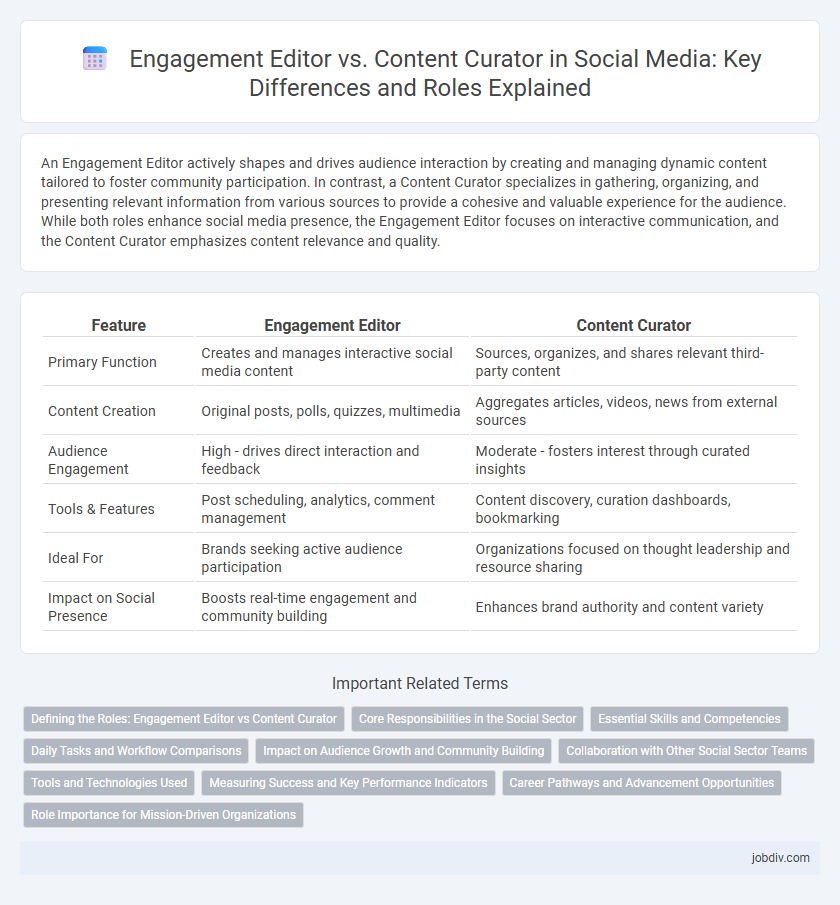An Engagement Editor actively shapes and drives audience interaction by creating and managing dynamic content tailored to foster community participation. In contrast, a Content Curator specializes in gathering, organizing, and presenting relevant information from various sources to provide a cohesive and valuable experience for the audience. While both roles enhance social media presence, the Engagement Editor focuses on interactive communication, and the Content Curator emphasizes content relevance and quality.
Table of Comparison
| Feature | Engagement Editor | Content Curator |
|---|---|---|
| Primary Function | Creates and manages interactive social media content | Sources, organizes, and shares relevant third-party content |
| Content Creation | Original posts, polls, quizzes, multimedia | Aggregates articles, videos, news from external sources |
| Audience Engagement | High - drives direct interaction and feedback | Moderate - fosters interest through curated insights |
| Tools & Features | Post scheduling, analytics, comment management | Content discovery, curation dashboards, bookmarking |
| Ideal For | Brands seeking active audience participation | Organizations focused on thought leadership and resource sharing |
| Impact on Social Presence | Boosts real-time engagement and community building | Enhances brand authority and content variety |
Defining the Roles: Engagement Editor vs Content Curator
An Engagement Editor focuses on fostering audience interaction by crafting compelling calls to action, moderating comments, and analyzing engagement metrics to optimize content reach. In contrast, a Content Curator selects, organizes, and presents relevant third-party content to provide value and context for the target audience. Both roles aim to enhance audience experience but differ in their approach, with the Engagement Editor prioritizing direct interaction and the Content Curator emphasizing content relevance and variety.
Core Responsibilities in the Social Sector
Engagement Editors drive active audience interaction by crafting compelling narratives and managing real-time conversations across social media platforms, ensuring consistent community growth and participation. Content Curators specialize in sourcing, organizing, and sharing relevant social media content to maintain a steady flow of valuable information that aligns with organizational goals. Both roles contribute to social media strategy, with Engagement Editors emphasizing direct user engagement and Content Curators focusing on content relevance and diversity.
Essential Skills and Competencies
Engagement Editors excel in audience interaction, requiring strong communication skills, social media proficiency, and the ability to analyze engagement metrics to tailor content strategies effectively. Content Curators prioritize research expertise, critical evaluation, and organizational skills to source, filter, and present relevant, high-quality information that aligns with brand goals. Both roles demand adaptability and creativity, but Engagement Editors focus more on real-time audience feedback while Content Curators emphasize content relevance and integrity.
Daily Tasks and Workflow Comparisons
Engagement editors prioritize fostering audience interaction by crafting and scheduling posts that encourage comments and shares, analyzing engagement metrics daily to optimize content impact. Content curators focus on sourcing, selecting, and organizing relevant third-party materials, ensuring the content aligns with brand voice and audience interests through consistent monitoring of industry trends. Both roles involve workflow coordination with marketing teams but differ as engagement editors actively manage community feedback while curators maintain a steady stream of valuable information.
Impact on Audience Growth and Community Building
Engagement Editors actively foster audience interaction by creating dynamic content tailored to spark conversations and deepen community ties, significantly boosting audience growth through increased participation. Content Curators strategically select and organize relevant information from diverse sources, enhancing community value and trust by delivering consistent, high-quality content that retains and attracts followers. Both roles are crucial for sustainable community building, as Engagement Editors drive immediate engagement while Content Curators maintain long-term audience interest and loyalty.
Collaboration with Other Social Sector Teams
Engagement editors play a crucial role in fostering collaboration with communications, marketing, and outreach teams to create cohesive social campaigns that drive community involvement. Content curators support these efforts by aggregating and organizing relevant social sector information, enabling other teams to access targeted, high-quality content efficiently. Together, their coordination enhances message consistency, stakeholder engagement, and the overall impact of social initiatives.
Tools and Technologies Used
Engagement Editors utilize advanced content management systems (CMS) such as WordPress and tools like Hootsuite for real-time social media monitoring and audience interaction. Content Curators rely heavily on aggregation tools like Feedly and Pocket to source and organize relevant information efficiently. Both roles integrate analytics platforms like Google Analytics and BuzzSumo to track content performance and optimize user engagement strategies.
Measuring Success and Key Performance Indicators
Measuring success for an Engagement Editor centers on metrics such as user interaction rates, comment volumes, and time spent on content, highlighting their role in fostering active audience participation. In contrast, a Content Curator's key performance indicators prioritize content relevance, diversity, and alignment with brand voice, often tracked through click-through rates, content shares, and audience growth. Both roles rely on analytics tools but utilize distinct KPIs that reflect their unique contributions to content strategy and audience engagement.
Career Pathways and Advancement Opportunities
Engagement Editors drive audience interaction by crafting compelling campaigns and analyzing user feedback, positioning themselves for roles in social media management or digital marketing strategy. Content Curators specialize in sourcing and organizing relevant materials to maintain brand voice consistency, creating pathways toward content management and editorial leadership. Both career paths offer advancement but differ in skill emphasis--creative engagement versus content mastery--shaping unique trajectories within social media and digital communication fields.
Role Importance for Mission-Driven Organizations
Engagement Editors play a crucial role in mission-driven organizations by crafting compelling narratives that resonate deeply with target audiences, thereby driving active participation and fostering a loyal community. Content Curators complement this by sourcing and organizing relevant, high-quality information that supports the organization's goals, ensuring the audience receives valuable and diverse perspectives. Together, their combined efforts amplify the organization's impact through strategic communication and meaningful content delivery.
Engagement Editor vs Content Curator Infographic

 jobdiv.com
jobdiv.com